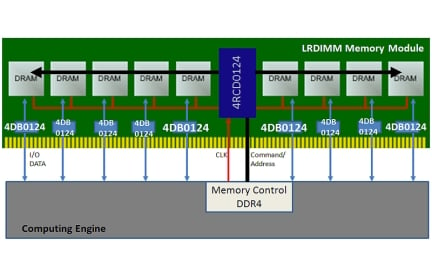Overview
Description
The 4DB0124K is a DDR4 Data Buffer with a dual 4-bit bidirectional data register with differential strobes is designed for 1.2 VDD operation.
Features
-
Pinout optimized DDR4 LRDIMM PCB layout
-
DDR4-1600/1866/2133
-
Supports CKE Power Down operation mode
-
Provides access to internal control words for configuring the device features and adapting in different LRDIMM and system applications
-
Available in 53-ball Fine-Pitch BGA (FPGA) with 0.50mm ball pitch, 14 x 5 Grid with 17 balls depopulated, 7.5mm x 3.0mm Package as defined in MO-276 (Issue F, Variation DA)
Comparison
Applications
Documentation
|
|
|
|
|---|---|---|
| Type | Title | Date |
| Overview | PDF 515 KB | |
| End Of Life Notice | PDF 536 KB | |
| Product Change Notice | PDF 32 KB | |
| White Paper | PDF 1.08 MB | |
| Product Change Notice | PDF 207 KB | |
| White Paper | PDF 5.22 MB | |
6 items
|
||
Design & Development
Models
ECAD Models
Schematic symbols, PCB footprints, and 3D CAD models from SamacSys can be found by clicking on products in the Product Options table. If a symbol or model isn't available, it can be requested directly from the website.

Product Options
Applied Filters:
Videos & Training
A white paper authored by IDT (acquired by Renesas) and Micron details research into memory and bandwidth for today's high-performance servers. LRDIMMS and RDIMMS traditionally have been seen as complementary, with the former targeting applications requiring deeper memory and the latter for applications requiring higher bandwidth.
The introduction of 8-gigabit DRAMS has resulted in a growing number of Internet applications benefiting from both deeper memories and higher bandwidth. This paper shows how 32 GB 2RX4 LRDIMMs transcend similar RDIMMs to meet the needs of today’s data center enterprise servers, by providing an optimal combination of deeper memory and higher data bandwidth, even at mainstream module densities.
Related Resources


